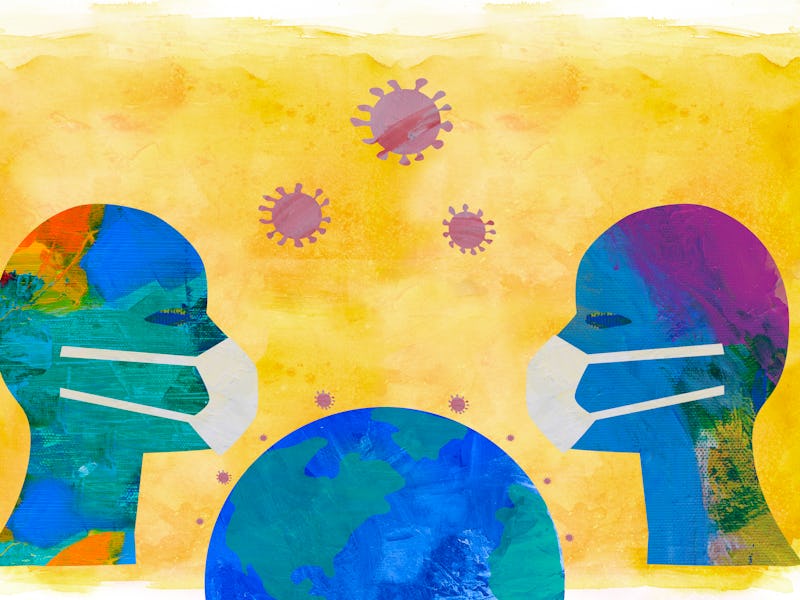What are the health effects of long-term social distancing?
Scientists use an unexpected model to find out.

Now that many of us have been working from home for a period of months, scientists have had the chance to study the effects of social distancing. And one group, out of London’s Global University, even decided to analyze zebrafish, a freshwater fish native to South Asia.
Why? “Most zebrafish demonstrate prosocial behavior, but approximately 10 percent are ‘loner’ fish who are averse to social cues and demonstrate different brain activity than their prosocial siblings,” according to a release about the study. “However, even typically social zebrafish avoid social interaction after a period of isolation.”
What part of the Covid-19 pandemic do you think causes the most confusion? We want to know. Take the Inverse reader survey
Essentially, the researchers wanted to see if our months of social distancing would have any lasting effects since “zebrafish and humans share a fundamental drive for social interaction that is controlled by similar brain structures.”
To study the effects of social distancing, the researchers took typically social zebrafish and isolated them for a period of two days. They then compared their brain activity to the “loner” fish. The isolated fish showed increased activity in brain regions related to stress and anxiety and were more sensitive to stimuli. But these effects were quickly overcome when the fish were given an anti-anxiety drug.
Another insight from the brain scans is that the hypothalamus of the loner fish, the region of the brain responsible for social rewards, did not show signs of experiencing rewards during social interactions as typical fish do. In comparison, the isolated fish experienced actively negative outcomes from social interaction.
The researchers concluded that people won’t be loners after lockdowns are lifted, but anxiety may be high when transitioning back to some sort of normalcy.
The dangers of distancing
The fact that we won’t be loners is a relief because a paper published in the journal Trends in Cognitive Sciences shows the dangers of continued isolation on our psychological well-being and physical health. In particular, loneliness directly impairs the immune system, leaving us more susceptible to diseases and infections.
“We are social creatures. Social interplay and cooperation have fueled the rapid ascent of human culture and civilization,” said paper co-author Danilo Bzdok, a McGill University associate professor of biomedical engineering and chair of Canada CIFAR Artificial Intelligence. “Yet, social species struggle when forced to live in isolation. From babies to the elderly, psychosocial embedding in interpersonal relationships is critical for survival. It is now more urgent than ever to narrow the knowledge gap of how social isolation impacts the human brain as well as mental and physical well-being.”
Fortunately, it seems our current efforts to socially distance haven’t led to an increase in loneliness. According to a nationwide survey conducted before and after stay-at-home orders of more than 2,000 people by Florida State University College of Medicine, researchers found only a small increase in loneliness among older adults. These levels were overall lower compared to those experienced by younger age groups. These increases among older adults also leveled off after the issuance of stay-at-home orders.
“There has been a lot of worry that loneliness would increase dramatically because of the social distancing guidelines and restrictions,” said lead author Martina Luchetti, an assistant professor at the College of Medicine. “Contrary to this fear, we found that overall loneliness did not increase. Instead, people felt more supported by others. Even while physically isolated, the feeling of increased social support and of being in this together may help limit increases in loneliness.”
Overcoming loneliness
One age group particularly affected by the negative effects of loneliness are the elderly, but this group also has a lot of wisdom to share. In January of this year, researchers at the University of California San Diego School of Medicine published a study about loneliness after interviewing 30 adults ages 67 to 92 living in a senior housing community.
While they found that 85 percent of the residents reported moderate to severe levels of loneliness, and that “loneliness is subjective,” they also uncovered factors that prevent loneliness.
“One participant spoke of a technique she had used for years, saying ‘if you’re feeling lonely, then go out and do something for somebody else.’ That’s proactive,” said senior author Dr. Dilip V. Jeste, senior associate dean for the Center of Healthy Aging and distinguished professor of psychiatry and neurosciences at UC San Diego School of Medicine. “Another resident responded, ‘I may feel alone, but that doesn’t mean I’m lonely. I’m proud I can live by myself.’”